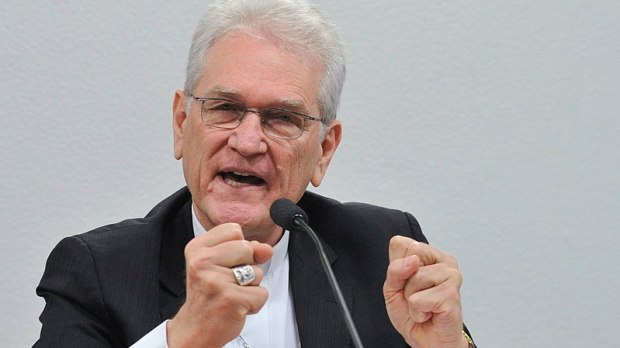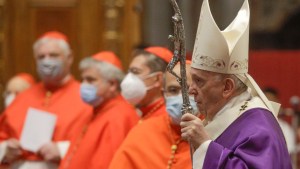On August 27, Leonardo Ulrich Steiner, 71, will become the first cardinal of the Amazon region. Since 2020, he has been archbishop of Manaus, the most populous city in the Amazon basin and the capital of the state of Amazonas in northwestern Brazil. His commitment to the Amazon and its inhabitants long predates this role, however; he had already held two episcopal posts in the region, as well as having served as auxiliary bishop of the archdiocese of the Brazilian capital Brasilia and as secretary general of the episcopate.
“My appointment is not just about me; we know that Pope Francis has a special affection for the Amazon and for the churches there. […] And now, with this appointment, he shows once again how close he is to our Churches. He is close to our region,” Bishop Leonardo Steiner told reporters at a press conference on May 30, 2022, after the announcement that he would receive the red biretta at the August 27 consistory.
The Brazilian prelate was born on November 6, 1950, in Forquilhinha, in the southern state of Santa Catarina, to a family of German origin. He was the 13th of 16 children, two of whom—a sister and a brother—also embraced religious life. In 1972 he entered the Order of Friars Minor, like his brother, and in 1978 he was ordained a priest by his cousin, Cardinal Paulo Evaristo Arns, then archbishop of São Paulo.
Before becoming a bishop and passionately defending the Amazon and its inhabitants, “Dom Leonardo” also held several positions of teaching and formation for novices and seminarians in Rome and Brazil. He studied philosophy at the Pontifical University of St. Anthony in Rome and later became its secretary and taught there from 1999 to 2003.
Serving the Amazon since the early 2000s
In 2005, Bishop Steiner was named a bishop by John Paul II and put in charge of the Prelature of São Félix do Araguaia, in Mato Grosso, one of the nine states of the Amazon basin.
This troubled area has historically experienced tensions between local indigenous people and landowners, as well as unrest during Brazil’s military dictatorship in the 1960s and 1970s. Bishop Steiner succeeded Spanish Bishop Pedro Casaldáliga, who was a proponent of liberation theology and a strong advocate for minorities and indigenous peoples. In a 2010 interview with O Diário, Bishop Steiner said that he had “no difficulty in continuing the work” of his predecessor and that all indigenous people “are part of the Church.”
During his tenure as prelate of São Félix do Araguaia, Bishop Steiner also became a member and reference point for the Indigenous Missionary Council (CIMI) of the Brazilian Bishops’ Conference (CNBB), which works for the protection of these peoples and their cultures.
Bishop Steiner’s support for these peoples continued after his departure from Mato Grosso, when in 2011 he was elected secretary general of the CNBB and also named auxiliary bishop of Brasilia, the country’s capital, holding both positions until 2019. In this important role, the Brazilian prelate was not afraid to speak out, individually and as a representative of the CNBB, on important social and political issues, including those concerning the Amazon and Brazil’s indigenous peoples.
Bishop Steiner and the CNBB condemned the corruption of Brazilian politicians and called for dialogue during governmental crises. The bishop also criticized the government’s focus on agribusiness at the expense of indigenous peoples and their lands, and called on politicians not to forget these peoples.
Where money begets violence
The Brazilian prelate was finally named archbishop of Manaus in November 2019 by Pope Francis, a month after the great synod of bishops on the Amazon, and was officially installed in January 2020. Manaus, a city located at a confluence of the Amazon, has more than two million inhabitants, and is a hub for the entire region. In 2022, Bishop Steiner was also named president of the Special Episcopal Commission for the Amazon, succeeding Cardinal Claudio Hummes, and vice president of the Ecclesiastical Conference of the Amazon Region (CEAMA).
Archbishop Steiner inherited a region plagued by growing tensions and violence, particularly since the election in 2018 of populist President Jair Bolsonaro, who has promoted policies that favor deforestation and intensive agriculture at the expense of indigenous people and the environment.
British journalist killed: impunity increases violence
In an interview with Tutameia in June 2022, responding to the murder of British journalist Dom Phillips and indigenous expert Bruno Pereira while reporting from remote areas of the Amazon rainforest, Bishop Steiner described the case as “a reflection of the violence that the Amazon is suffering.” He lamented the fact that “impunity has increased the violence” and said that “it is necessary for the law to act, for justice to act. Here there is a lack of surveillance and punishment.”
“He is not a bishop who sits on the fence. When he talks, people hear him. Since he became Manaus’ archbishop, he has delivered a strong and prophetic message,” Fr. Luis Miguel Modino, communications officer for the North 1 regional chapter, of which Manaus is a part, told Crux.
In addition to the problems in the Amazon, Manaus was also one of the hardest hit cities in Brazil during the COVID-19 pandemic, as health services failed to treat the high number of cases. In January 2021, the average number of deaths in the state of Amazonas rose to 130 people per day. In total, more than 14,000 people have died since the crisis began.
Archbishop Steiner strongly condemned the government’s response to the pandemic, stating in an interview with Tutameia in February 2021 that “they were elected to take care of the people, but that’s not what is happening.”
Fr. Zenildo Lima da Silva, rector of the seminary of the archdiocese of Manaus, told Crux that Bishop Steiner has been extremely active in trying to help the suffering population, personally participating in the distribution of medical supplies and organizing spiritual and material assistance for grieving families.
The Synod on the Amazon
At a press conference on May 30, 2022, future Cardinal Leonardo Steiner reminded reporters that he had personally delivered to Pope Francis a request from the Brazilian bishops of Amazonia asking for a synod on Amazonia, showing his closeness to the cause. The Synod was then announced in 2017 and held in October 2019, and as CNBB secretary general at the time, Archbishop Steiner was involved in all the preparatory work.
While some see his cardinalate as a “fruit” of the Synod on Amazonia, the prelate felt that “perhaps the Pope is asking our Churches to really tackle the Synod, especially Querida Amazonia and the Final Document.”


